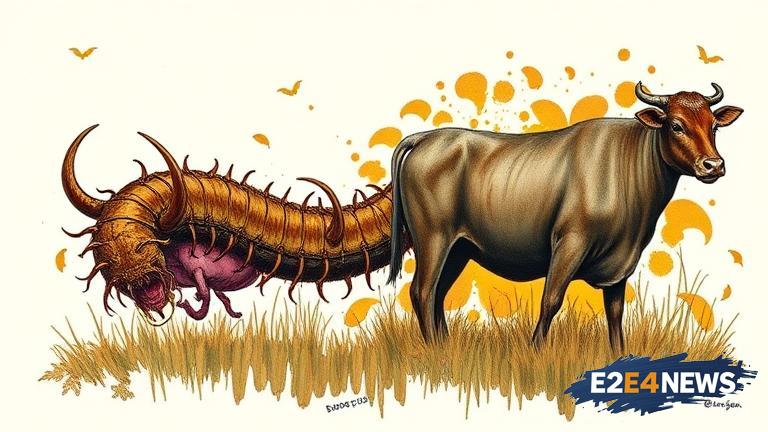A recent outbreak of screwworm in the United States has raised concerns among ranchers and animal health experts. The parasitic infection, caused by the larvae of the Cochliomyia hominivorax fly, can be fatal to animals if left untreated. In a positive development, a patient in Maryland has been reported to have recovered from the infection. However, ranchers have criticized the secrecy surrounding the outbreak, citing a lack of transparency and communication from authorities. The screwworm outbreak has significant implications for the livestock industry, with many ranchers expressing frustration over the handling of the situation. The parasite can infest a wide range of animals, including cattle, sheep, and goats, causing significant economic losses. The US Department of Agriculture (USDA) has been working to contain the outbreak, but ranchers argue that more needs to be done to prevent the spread of the disease. The USDA has implemented measures such as quarantine zones and vaccination programs, but some ranchers feel that these efforts are insufficient. The secrecy surrounding the outbreak has also raised concerns about the potential for the parasite to spread to other areas. Ranchers are calling for greater transparency and communication from authorities, including regular updates on the status of the outbreak and the measures being taken to contain it. The recovery of the patient in Maryland is a positive development, but it is unclear whether this is an isolated case or part of a larger trend. The USDA has confirmed that the patient was infected with the screwworm parasite, but has not released further details about the case. The agency has also declined to comment on the criticism from ranchers, citing the need to protect sensitive information. Despite the challenges posed by the outbreak, many ranchers remain optimistic about the ability to contain the disease. However, others are more pessimistic, citing the potential for the parasite to spread to other areas and the lack of effective measures to prevent this. The screwworm outbreak has also raised concerns about the potential for the parasite to infest other animals, including wildlife. The USDA has warned that the parasite can infest a wide range of animals, including deer and other wildlife, and has urged hunters and outdoor enthusiasts to be vigilant. The agency has also implemented measures to prevent the spread of the disease to other areas, including restrictions on the movement of animals. The recovery of the patient in Maryland is a positive development, but it is clear that the outbreak is far from over. The USDA and other authorities will need to continue to work to contain the disease and prevent its spread to other areas. The secrecy surrounding the outbreak has raised concerns about the potential for the parasite to spread, and it is unclear whether the measures being taken are sufficient to prevent this. The USDA has confirmed that the outbreak is ongoing, but has not released further details about the status of the disease. The agency has also declined to comment on the criticism from ranchers, citing the need to protect sensitive information. The screwworm outbreak has significant implications for the livestock industry, and it is clear that more needs to be done to prevent the spread of the disease. The recovery of the patient in Maryland is a positive development, but it is only the beginning of what will likely be a long and challenging process to contain the outbreak.
